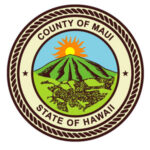 Members of the Focus Maui Nui Youth Alliance planted native species and uprooted invasive ones in an effort to contribute to the reforestation of Honokowai Valley. The project, completed in May and prior to the summer break, was an opportunity to learn about and support the work of the nonprofit Maui Cultural Lands. “It was a great way to end the year within the theme of Community Enrichment Through Volunteerism,” said Youth Alliance Coordinator Willow Krause. Youth Alliance members attend monthly events during the school year to explore and gain a greater understanding of key components in the Maui community. Their gatherings are coordinated by the Maui Economic Development Board, which is marking its 30th year here on island.
Members of the Focus Maui Nui Youth Alliance planted native species and uprooted invasive ones in an effort to contribute to the reforestation of Honokowai Valley. The project, completed in May and prior to the summer break, was an opportunity to learn about and support the work of the nonprofit Maui Cultural Lands. “It was a great way to end the year within the theme of Community Enrichment Through Volunteerism,” said Youth Alliance Coordinator Willow Krause. Youth Alliance members attend monthly events during the school year to explore and gain a greater understanding of key components in the Maui community. Their gatherings are coordinated by the Maui Economic Development Board, which is marking its 30th year here on island.
Youth Alliance member Alisha Summers said she was impressed by Maui Cultural Lands, a Maui-based grass roots land trust organization whose mission is to stabilize, protect and restore Hawaiian cultural resources. The goal in Honokowai Valley and Kaanapali is to reforest the areas with native and endemic Hawaiian plant species. “It is wonderful to know there are people who have dedicated themselves to uncover what the ancient Hawaiians left behind,” said Summers, who will be entering her senior year at Baldwin High School this fall. She’s completed her third year with the Youth Alliance and is considering a career in medicine or environmental science after college.
Summers said her first trip to Honokowai Valley included lessons on how Native Hawaiians lived sustainable lifestyles in the area and why it is important to protect and restore the cultural resources of the land. Students toured parts of a restored Hawaiian village and were invited to taste kukui sap, which Summers described as an ingredient used for medicinal uses and as a mouth cleanser. She said the highlight of the daylong trip was to plant native species. They picked up river rocks and placed them around the trunk of each new plant. “Surveying the work that I did gave me a sense of satisfaction that I was contributing to the preservation of our historic sites,” Summers said. “By educating our youth, Hawaii’s next generation will become aware that without sustainable practices, many outdoor activities may be significantly compromised.”
